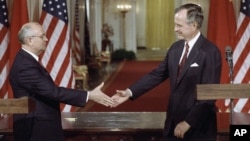June 1 marks the anniversary of a historic meeting more than a quarter century ago between the leaders of the United States and what was then the Soviet Union that resulted in an agreement to end the production of chemical weapons. Three years later, more than 150 nations signed on to a comprehensive treaty banning chemical weapons - but despite those efforts they remain a threat today.
At a summit meeting in 1990 in Washington, D.C., then-U.S. President George H.W. Bush and Soviet leader Mikhail Gorbachev inked a deal agreeing that each country would stop producing chemical weapons and begin destroying 80 percent of their considerable chemical weapons reserves.
The agreement led to a worldwide chemical weapons convention overseen by an intergovernmental organization based in The Hague, Netherlands, known as the Organization for the Prohibition of Chemical Weapons (OPCW). The organization conducts inspections of weapons production facilities, as well as sites where weapons are being destroyed. It can also investigate cases where chemical weapons are alleged to have been used.
International cooperation
Most of the nations of the world have agreed to be bound by the convention, which prohibits the use and production of chemical weapons. As of October 2015, about 90 percent of the world's stockpile of chemical weapons had been destroyed.
Three states have neither signed nor agreed to adhere to the treaty: Egypt, North Korea, and South Sudan. Israel has signed the agreement but not ratified it.
Two of the most recent states to declare their chemical weapons are Iraq and Syria, in 2009 and 2013 respectively.
Modern chemical weapons were first used on the battlefields of the World War I, when troops released chlorine and phosgene gases into the air to kill or disable opposing forces. The gas caused tens of thousands of deaths and more than a million injuries, scarring some soldiers for life.
The Cold War of the 1950s and 1960s saw both the United States and the Soviet Union build up chemical weapons stockpiles. The governments of Iran and Iraq are recorded as having used chemical agents on their own citizens in the 1980s.
Lingering mistrust
The regime of Syrian President Bashar al-Assad was alleged to have used chemical weapons against his people in 2013. Since then, experts have said the danger of chemical weapons attacks still exists in Syria. British chemical weapons expert Hamish de Bretton-Gordon, a veteran of the British military and NATO, has been speaking out in recent weeks for a no-fly zone to be established over Syria, contending that President Assad is using helicopters to mount chemical attacks on civilians.
Russia and China, meanwhile, say they suspect rebel groups opposing Assad's government of trying to acquire chemical weapons. In April, the two nations sent a resolution to the Security Council calling on Syria's neighbors to inform the United Nations if they find that any extremists groups are trying to obtain them. Russian Ambassador to the U.N. Vitaly Churkin told reporters Russia thinks terrorists might have brought the components of chemical weapons with them from Syria to Europe.
Chemical weapons, along with biological weapons and nuclear weapons, are considered weapons of mass destruction. Biological and nuclear weapons are also subject to international nonproliferation treaties.










